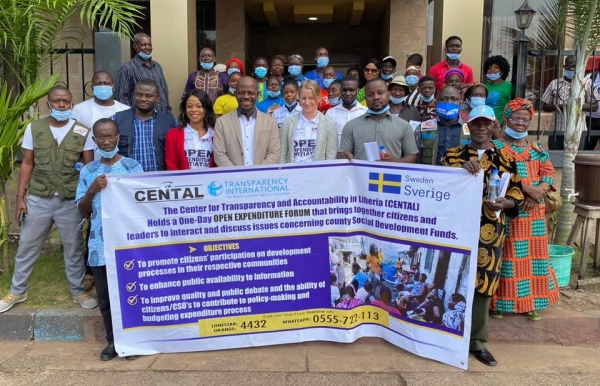Citizens Demand Openness in CSDF Expenditures
Monrovia, Tuesday, 22 February 2022 - Openness and accountability in budget and expenditure processes foster trust in government as it ensures citizens’ views and interests are respected and public resources are used for the public good.
Even though laws exist to promote transparency and accountability, as well as to prevent corruption in the expenditure of public resources including the County Social Development Fund (CSDF), the conduct of the custodians of these resources continue to fall short of meeting minimum benchmarks of transparency, accountability and anti-corruption. Citizens continue to decry lack of participation, transparency, and accountability. Even worse is the fact that many are convinced that corruption is the ultimate rationale for their exclusion. Participants of the Center for Transparency and Accountability in Liberia (CENTAL)’s Open Expenditure Forums (OEFs) held recently in Bong, Nimba, Rivercess, and Grand Bassa counties have re-echoed this point. However, there are other shining examples of participation worth noting.
“Construction works for persons with disabilities (PWDs) require lots of technical things to allow easy access for all persons with disabilities. So, it cannot be done by just anybody (engineer), the person must either be guided or knowledgeable of PWDs,” said Arthur Bondo, representative of the National Union of Organizations with Disabilities (NUOD) and Chairman of the Bong County Disable Community.
Bondo said members of the disable community in Bong County were never part of any discussion leading to, or involved with any process that led to the renovation of their headquarters in the county. According to him, the US$10,000.00 spent by the county to renovate the structure cannot accommodate the current one hundred and thirty-nine (139) persons with disabilities in Gbarnga City alone, but they are disappointingly managing it.
Like in Bong County, the Nimba County disable community was never involved with process leading to the construction of their headquarters in Sanniquellie City. Abestine Tozay, President of the group said they were excluded from the decision-making and the contractor who was hired to do the construction said he wasn’t answerable to them. Meanwhile, in Rivercess County, people with disabilities equally feel marginalized and excluded from all decision-making and developmental initiatives of the county.
Mr. Samuel Outland, head of the Organization of Persons with Disabilities in the county said people with special needs are surviving under extreme conditions and the county leadership care less about their wellbeing. The situation of persons with disabilities seem dreadfully similar across the counties. Peter Jimmy of the Group of 77 in Grand Bassa County also shared the same story. Mr. Jimmy frowned on the local authorities, especially members of the Project Management Committee (PMC) for the lack of inclusion of persons with disabilities in activities in the County.
But unlike the Disable Community in Bong, the Bong County Women Organization was involved throughout the implementation of their project. They were constructively engaged with most of the processes leading to the construction of the Bong Women Center. She stated that as a result of their robust monitoring of the construction process, they were able to identify and demand the change of a design that was not submitted by the women.
Sadly, this is not the case in Nimba. Women complain they are yet to be included on the County Council Sitting Resolution despite all efforts exerted so far. “County Sittings have been held in Nimba, but we (women of Nimba) have not even served as observers, except on one occasion,” said Madam Yah Belleh Suah, County Coordinator, Ministry of Gender, Children and Social Protection.
She stated that until that lone occasion where she was reluctantly considered to serve as observer at the County Sittings, the Ministry nor the women of the County were never part of the process; but, Nimba County Assistant Superintendent for Development said the selection of delegates to the County Sitting is beyond the scope of the County leadership.
The Project Management Committees (PMCs) are charged with the responsibility of implementing projects.
In Bong County, the PMC received US$1.7 million out of the budgeted US$2.9 million in the 2018/2019 County Council Sitting to implement 30 projects, out of which 12 have so far been completed and dedicated, while in Nimba, of the US$2.8 million budgeted in the 2021 County Council Sitting, US$2.7 million was received to implement forty-six (46) projects in the county out of which twenty (20) have been completed so far.
The essence of the Forum is to promote openness and accountability in the public space through access to information that is very critical to the consolidation of the Country’s democracy. It provides the space for citizens to interact with government officials and voice concerns about the effectiveness and efficiency of resources expended and or projects and activities undertaken by public officials by and through their resources, especially the County Social Development Funds.
The Open Expenditure Forum also sought to provide stakeholders with information on broad and specific national efforts in fighting against Corruption and efforts to promote the culture of accountability and transparency in Liberia.
It’s part of activities under CENTAL’s National Integrity Building and Anti-Corruption (NIBA) Program targeting seven counties – Montserrado, Bong, Nimba, Grand Bassa, Rivercess, Bomi and Gbarpolu. It’s funded by the Government of Sweden through the Swedish International Development Cooperation Agency (SIDA).

